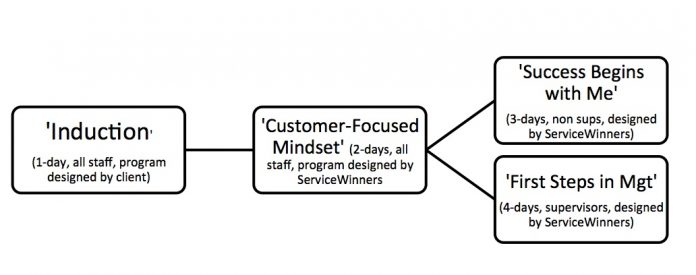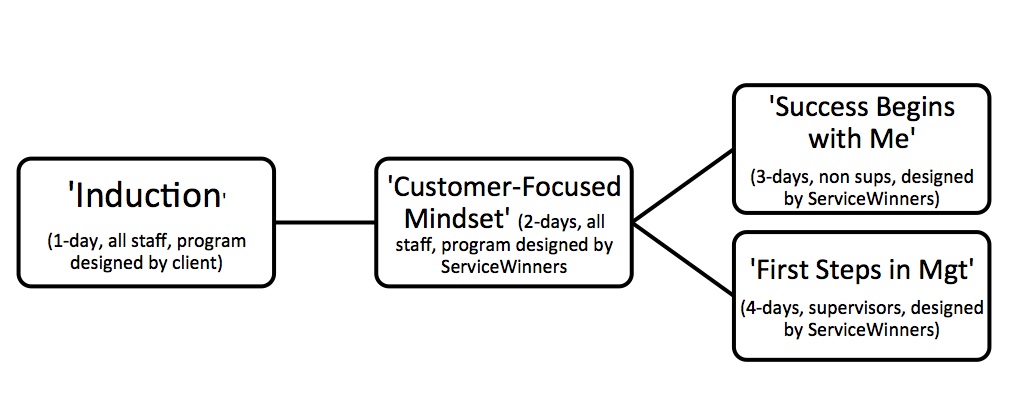
Our Malaysia-based training company was selected to help a new Myanmar telecommunications company launch its service. It had paid billions of dollars for the rights to a 15-year license and wanted to capitalize on this investment quickly. The training need was to get their local staff up to speed in working in a modern telecommunications company within four months.
The company was hiring between 100 and 200 locals per month, most of whom could speak English. In addition, the company employed expats from 50-plus countries in a variety of skill areas to assist in the launch. One of the license requirements was that within 10 years, the company must employ 95-plus percent locals.
MYANMAR’S CHALLENGES
Besides the challenges from the client, the country it self posed other challenges to our training team:
- Suitable accommodations are difficult to find. Myanmar has an undeveloped business and tourist scene after being under sanctions for 40-plus years. As a result, the hotel standards are lacking. Each night, we needed to cover ourselves with mosquito repellent in a four star hotel that would be lucky to qualify for one star anywhere else. Yangon’s mosquitoes are everywhere.
- Basic infrastructure is lacking. We found ourselves walking alone at night on dimly lit—or even dark—streets. Most of Myanmar runs on generators, and whole sections of town can be blacked out when there is an engine failure. One time, while landing in Yangon, I could see whole sections of the city having their electricity turned off for whatever reason. That said, Myanmar is a safe country, and you will see locals walking along chatting without any worries. Many men will wear their billfolds sticking out the back of their longyis (like sarongs, they are without pockets) without any worry of being robbed.
- Commuting to work involves using taxi drivers. As anywhere in the world, some drivers are good and some not so good. This is especially a concern when traveling on weekends and particularly at night as sometimes we found the drivers drinking together. This was the first time I had to make a group of taxi drivers complete a sobriety test and then choose the least drunk one for my ride home. The taxis here have the steering wheel on the right, but the cars drive on the right.
- U.S. dollars are king. Credit cards are rarely accepted. If any U.S. bill had the slightest tear or crinkle, it was rejected. We eventually stopped carrying U.S. dollars in our wallets and instead carried the bills in a non-foldable envelope to protect them.
THE TRAINING SOLUTION
Prior to the training rollout, we had done a Training Needs Analysis (TNA) six months earlier with the client. From those meetings and before rollout, we stayed in contact with the client to understand their current situation.
To train large numbers of locals quickly in basic skill areas, it was agreed that we would create the following core training curriculum:

All staff attended the client-designed Induction program. Since the client was a start-up with few local trainers, we often conducted this session.
Afterward, the staff attended a two-day mostly attitudinal workshop about the importance of customer service in a modern, competitive economy. This workshop was named “Customer-Focused Mindset” (CFM). We used case studies from best-in-service worldwide companies. We shared with them a simple customer service model. The program ended with an individual commitment from each learner on how he or she would deliver high customer service with the company’s internal or external customers. This commitment was written on a 15-foot banner and displayed prominently within the company, with each training session’s group photo attached.
After CFM, the staff separated into two groups. The non-supervisors attended our three-day program called “Success Begins with Me.” It taught the basics of working with colleagues and supervisors in a modern organization. The supervisors attended our four-day program called “First Steps in Management.” It taught the basics of supervising and leading others.
TRAINING ENVIRONMENT
Since we were in a start-up environment, we often would be called on with little notice to deliver a quick ad-hoc program. For example, “Steve, can you guys deliver an ‘Interviewing Skills’ course in two days’ time?” Our trainers have experience working in start-ups, including Afghanistan, and enjoyed such last-minute requests that pushed our skills to the limit.
The Myanmar learners were fantastic. Our training team has trained throughout Asia-Pacific, and beyond, and found the Myanmar learners to be the best we have ever encountered. We came with preconceived ideas that the learners would have poor English language skills. What we encountered was the opposite. Since incomes are low and unemployment high in Myanmar, our client was able to pick and choose from the best candidates. Hired employees were in their 20s, highly motivated, English-speaking, modern, with a positive outlook for their new employer and Myanmar’s future.
The learners were ethnically mixed, with the majority being Burmese Buddhist, but there were also learners from the various hill tribe minorities such as Mon, Kachin, Chin, and Shan. Unlike Afghanistan, this diversity was not an obstacle. We detected no “silent elephant” in the room. They seemed to consider themselves all Myanmar. That said, we brought up the topic of the Rohingya minority as many of them have relocated to our home country of Malaysia. This was greeted with awkward silence. We never brought up the subject again.
Unlike many East Asian countries where class participation can be problematic due to the fear of losing face, in Myanmar, class participation was excellent. The learners shared their ideas and concerns. Like most Southeast Asians, they were sporting, even playful, when taking part in the training activities. Right before taking a 15-minute group tea break, the learners asked one of our trainers if they could dance during the break. That has never happened before for my training team in Malaysia. For most learners, this was the first time they had ever attended a “modern” training program. The change from the accustomed classroom lecture-style learning environment was enthusiastically received.
Myanmar learners are highly motivated to learn. After class, they asked for additional reading material to better develop their skills. They sought our feedback—on the side—in order to perform better than their peers. They explained that their income supports many family members. If they can move up faster in the organization, they can improve their families’ living conditions. Training such motivated learners helped to energize our trainers’ batteries.
POST-TRAINING FUN IN YANGON
Yangon is the country’s largest city, but it’s largely undeveloped. There were no McDonald’s or KFCs when we were there. I’m sure in 10 years, it probably will be unrecognizable. Still, it’s interesting to see how the locals live as it is likely how our grandparents once lived. Myanmar has had economic sanctions on it for most of its existence, so the place looks like it is stuck in a time warp. This time warp also may explain why the people are so nice.
If you have the time, see the largest Buddhist temple in the world: Shwedagon temple. It’s the holiest temple in all Myanmar. You will see Myanmar people from all walks of life there going to pray and receive blessings. Each time I visited, some locals would ask me to be in their pictures. As a middle-aged man, this hasn’t happened in a long time.
The Bogyoke Market is an interesting indoor/outdoor market where the locals and tourists shop. It’s a nice place to have tea and watch the locals carry on with their business. Besides the normal food essentials, the market also sells jewelry, hardwood carvings, and oil paintings.
Myanmar’s streets are dotted with tea/ beer houses. The locals sit on low stools and pass the time of day. Basic tea is free—even in restaurants— as it’s Myanmar custom to offer visitors free tea as a way of demonstrating hospitality.
The best thing about Myanmar is its people. They are genuinely polite and kind. Money is important, but it’s not the most important thing in most people’s lives here. Old-fashioned values dominate here. Luckily, many of the locals speak a smattering of English, so you are able to understand their lives and challenges better than in other Asian countries.
Ultimately, Myanmar can pose many challenges for trainers, but the experience was likely the best training experience we have ever had. If you have a chance to train in Myanmar, take it! But be sure to bring plenty of perfect U.S. dollars and mosquito repellen.
Steve Coyle is an American trainer based in Malaysia for 20 years. He’s managing consultant of ServiceWinners International, a training company delivering programs throughout the Asia-Pacific region. He can be contacted at steve@servicewinners.com.


